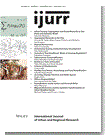This article, based on interviews with bouncers and on ethnographic observations in two nightlife districts in the centre of two Dutch cities, Utrecht and Rotterdam, shows that public–private collaboration reveals ways of controlling public space that differ from traditional ways of policing. It demonstrates that plural policing does not automatically imply greater responsibility of private actors towards public (nightlife) spaces. A history of mistrust of private security, bouncers’ increasingly ambiguous working conditions and the high levels of surveillance bouncers are subject to result in bouncers rather focusing on protecting the nightclub for which they are responsible and guaranteeing their own safety within the surveillance network, than on venturing out into public spaces to ‘protect and assure visitors’ safety’, as is assumed in Safe Nightlife Policies.
Details
Written by:
Van Liempt and Van Aalst
Digital Object Identifier (DOI)
10.1111/1468-2427.12320
About DOI

